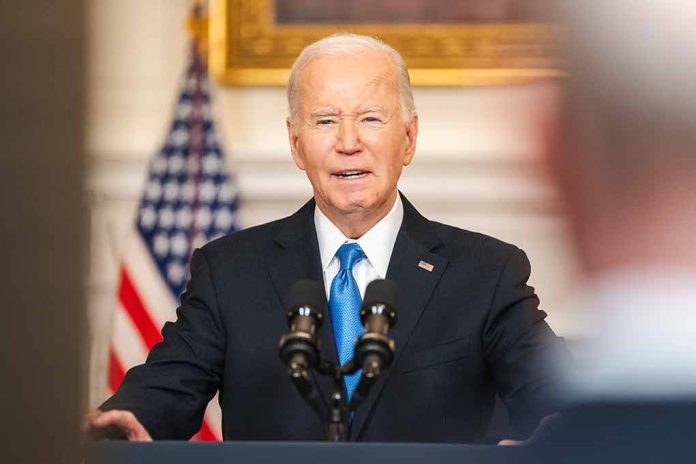
President Biden commutes sentences for nearly 2,500 non-violent drug offenders, sparking debate on criminal justice reform.
At a Glance
- Biden commutes sentences for nearly 2,500 inmates convicted of non-violent drug offenses.
- Commutations address disproportionately long sentences, particularly for crack versus powder cocaine offenses.
- Action aligns with Fair Sentencing Act of 2010 and First Step Act of 2018.
- Biden now holds record for most individual pardons and commutations in U.S. history.
- White House has not released names of those receiving commutations.
Biden’s Unprecedented Move in Criminal Justice Reform
President Joe Biden has taken a significant step in criminal justice reform by commuting the sentences of nearly 2,500 non-violent drug offenders. This action, one of the most substantial of his presidency, aims to address longstanding disparities in drug sentencing and provide a second chance for individuals to reintegrate into society. The move has positioned Biden as the president with the most individual pardons and commutations in U.S. history, a fact that has drawn both praise and criticism from various quarters.
The commutations primarily target those who received disproportionately long sentences compared to current laws, particularly focusing on the discrepancy between crack and powder cocaine offenses. This decision aligns with the Fair Sentencing Act of 2010 and the First Step Act of 2018, both of which aimed to correct historical sentencing disparities that have disproportionately affected minority communities.
Addressing Sentencing Disparities
Biden’s action is rooted in a recognition of the need to rectify past injustices in the criminal justice system. Many of those affected by these commutations were sentenced under outdated and now-discredited distinctions between crack and powder cocaine, which led to significantly harsher punishments for crack cocaine offenses.
“Today’s clemency action provides relief for individuals who received lengthy sentences based on discredited distinctions between crack and powder cocaine, as well as outdated sentencing enhancements for drug crimes.” – Biden
The President’s decision reflects a broader shift in approach to drug-related offenses, emphasizing rehabilitation and second chances over punitive measures. However, it’s worth noting that the White House has not released the names of those receiving commutations, a decision that may invite scrutiny from those seeking greater transparency in the process.
Broader Context and Criticisms
While this move has been largely celebrated by criminal justice reform advocates, it has not been without controversy. Biden has faced bipartisan criticism for some of his clemency decisions, including the commutation of sentences for 37 out of 40 people on federal death row and the pardoning of his son, Hunter Biden, for federal gun and tax violations.
These decisions have raised questions about the scope and application of presidential clemency powers. Critics argue that some of these actions may be politically motivated, while supporters maintain that they are necessary steps towards a more just and equitable legal system.
Looking Ahead
As of January 13, there were still 1,947 individuals awaiting pardons and approximately 6,625 cases awaiting commutation. Biden has expressed his intention to continue reviewing cases before his term ends, suggesting that we may see further clemency actions in the coming days.
As the Biden administration nears its end, there is speculation about potential targeted pardons for allies, a practice not uncommon for outgoing presidents. This raises questions about the balance between addressing systemic injustices and the potential for political favoritism in the use of presidential clemency powers.
Sources:
- Biden Commutes 2,500 Sentences for Non-Violent Drug Offenders
- Biden commutes nearly 2,500 more sentences in final days of presidency
- Biden sets record by commuting sentences of nearly 2,500 people convicted on nonviolent drug charges




